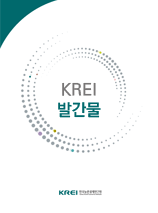
- A Study on the Country of Origin Labeling in Food Service Sector
-

-
Koreans' rising interest in food safety, more frequent eating out and the resumption of US beef imports in 2008 have been combined to deepen the anxiety of Korean consumers about the country of origin of food materials they are eating at restaurants. To address the concern, the origin of food labeling in restaurants was introduced in Korea in 2007 to a limited extent. However, since it is still at its infancy, multiple issues have been raised.
Against this background, this study aims to draw up measures for improving the country of origin labeling in restaurants, thereby giving right information to consumers and keeping the agri-food distribution in good order. To this end, the study examined the current usage of the country of origin labeling in restaurants and conducted a questionnaire survey of restaurants and consumers to analyze restaurants' compliance of the labeling and consumers' usage. In addition, the country of origin labeling programs in some advanced countries were studied to learn about their operations and come up with measures for improvement.
In Korea, the country of origin labeling in restaurants was first applied to a limited number of beef items under the "Food Sanitation Act" in 2007. After the importation of US beef, the Ministry of Food, Agriculture, Forestry and Fisheries revised the "Agricultural Products Quality Control Act" to put rice (June 22, 2008), beef (July 8, 2008), pork, chicken and whole cabbage kimchi (December 22, 2008) under the scope of the country of origin labeling.
The country of origin labeling in restaurants is currently managed by two ministries: the Ministry of Health, Welfare and Family Affairs ("Food Sanitation Act") and the Ministry of Food, Agriculture, Forestry and Fisheries ("Agricultural Products Quality Control Act"). Accordingly, the government's supervision of the labeling system is polarized. For meat products, the "Food Sanitation Act" applies to "ordinary" restaurants with a floor space of more than 100㎡ whereas the "Agricultural Products Quality Control Act" applies to all types of restaurants. In the case of beef, the "Food Sanitation Act" requires the country of origin labeling on main dishes, while the "Agricultural Products Quality Control Act" requires labeling for all types of food including processed meat. This inconsistent and polarized legal control has caused confusion in implementing the program.
To find out the adoption level of the country of origin labeling by restaurants, 307 restaurants in Seoul were surveyed and it was found that 95.7% of them had put it in place, and their awareness of the program in general and their trust in the program are considerably high.
Nevertheless, 28% of the restaurants responded stated their difficulty in applying the program. 24.9% agreed on the need to expand the scope of labeled items while 17.2% said that it is necessary to reduce the scope. 36.8% said that the application of the labeling needs to be differentiated depending on the size of business. Furthermore, 63.5% was positive about extending the preparatory guidance period before full implementation, and 64.1% said that the labeled items should be limited to main dishes only. The overall view of the restaurants responded was that there is a strong demand for revising the current labeling program.
The other survey of 379 consumers living in Seoul has found that their interest in country of origin labeling in restaurants is very high at 74.6%. They highly regarded the effectiveness of the labeling in restaurants as it reduces consumers' anxiety and protects the consumers' right to choose. However, 47.2% of the consumers responded said that it is difficult to find labeling information in restaurants, and the level of consumer confidence in country of origin labeling was very low at 24.8% due to the possibility of lying about the country of origin, the difficulty of validating the country of origin of food materials in restaurants, and the limitation of monitoring on the part of the government. This result indicates that some improvement is necessary to effectively implement the program.
The consumer survey showed that the share of respondents who said it is necessary to expand the scope of labeled items is as high as 75.7% and that 91% approve of full implementation of the labeling on all restaurants. In addition, a high percentage of consumers raised the need to lengthen the preparatory guidance period. As for the questions on changing the labeling provision from a mandatory duty to a recommendation and on limiting the items for labeling to main dishes only, the majority of the respondents expressed their objection.
For the active implementation of the labeling program in the future, we need to focus on laying a groundwork by engaging in following activities: building a unified legal and control system for consistent and efficient application; operating the mandatory and recommended labeling programs at the same time; expanding the application of country of origin labeling to some important items; ensuring equal treatment of restaurants subjected to labeling; simplifying beef labeling; and clarifying the labeling methods and targets for processed meat products and whole cabbage kimchi; adjusting penalty amount; expanding the infrastructure for proper food tracking and management; improving labeling methods; and providing sufficient guidance period and public relations support.
Researchers: Lee Kyei-Im, Hwang Yun-Jae, Son Eun-Young
Research period: 2008. 11. - 2009. 2.
E-mail address: lkilki@krei.re.kr -
목차
-
서론
음식점 원산지표시제도의 운영 현황
음식점 원산지표시제도 도입 실태 평가
소비자의 음식점 원산지표시 이용 실태 평가
주요국의 음식점 원산지표시 사례
음식점 원산지표시제도의 정책과제
요약 및 결론
요약문
Koreans' rising interest in food safety, more frequent eating out and the resumption of US beef imports in 2008 have been combined to deepen the anxiety of Korean consumers about the country of origin of food materials they are eating at restaurants. To address the concern, the origin of food labeling in restaurants was introduced in Korea in 2007 to a limited extent. However, since it is still at its infancy, multiple issues have been raised.
Against this background, this study aims to draw up measures for improving the country of origin labeling in restaurants, thereby giving right information to consumers and keeping the agri-food distribution in good order. To this end, the study examined the current usage of the country of origin labeling in restaurants and conducted a questionnaire survey of restaurants and consumers to analyze restaurants' compliance of the labeling and consumers' usage. In addition, the country of origin labeling programs in some advanced countries were studied to learn about their operations and come up with measures for improvement.
In Korea, the country of origin labeling in restaurants was first applied to a limited number of beef items under the "Food Sanitation Act" in 2007. After the importation of US beef, the Ministry of Food, Agriculture, Forestry and Fisheries revised the "Agricultural Products Quality Control Act" to put rice (June 22, 2008), beef (July 8, 2008), pork, chicken and whole cabbage kimchi (December 22, 2008) under the scope of the country of origin labeling.
The country of origin labeling in restaurants is currently managed by two ministries: the Ministry of Health, Welfare and Family Affairs ("Food Sanitation Act") and the Ministry of Food, Agriculture, Forestry and Fisheries ("Agricultural Products Quality Control Act"). Accordingly, the government's supervision of the labeling system is polarized. For meat products, the "Food Sanitation Act" applies to "ordinary" restaurants with a floor space of more than 100㎡ whereas the "Agricultural Products Quality Control Act" applies to all types of restaurants. In the case of beef, the "Food Sanitation Act" requires the country of origin labeling on main dishes, while the "Agricultural Products Quality Control Act" requires labeling for all types of food including processed meat. This inconsistent and polarized legal control has caused confusion in implementing the program.
To find out the adoption level of the country of origin labeling by restaurants, 307 restaurants in Seoul were surveyed and it was found that 95.7% of them had put it in place, and their awareness of the program in general and their trust in the program are considerably high.
Nevertheless, 28% of the restaurants responded stated their difficulty in applying the program. 24.9% agreed on the need to expand the scope of labeled items while 17.2% said that it is necessary to reduce the scope. 36.8% said that the application of the labeling needs to be differentiated depending on the size of business. Furthermore, 63.5% was positive about extending the preparatory guidance period before full implementation, and 64.1% said that the labeled items should be limited to main dishes only. The overall view of the restaurants responded was that there is a strong demand for revising the current labeling program.
The other survey of 379 consumers living in Seoul has found that their interest in country of origin labeling in restaurants is very high at 74.6%. They highly regarded the effectiveness of the labeling in restaurants as it reduces consumers' anxiety and protects the consumers' right to choose. However, 47.2% of the consumers responded said that it is difficult to find labeling information in restaurants, and the level of consumer confidence in country of origin labeling was very low at 24.8% due to the possibility of lying about the country of origin, the difficulty of validating the country of origin of food materials in restaurants, and the limitation of monitoring on the part of the government. This result indicates that some improvement is necessary to effectively implement the program.
The consumer survey showed that the share of respondents who said it is necessary to expand the scope of labeled items is as high as 75.7% and that 91% approve of full implementation of the labeling on all restaurants. In addition, a high percentage of consumers raised the need to lengthen the preparatory guidance period. As for the questions on changing the labeling provision from a mandatory duty to a recommendation and on limiting the items for labeling to main dishes only, the majority of the respondents expressed their objection.
For the active implementation of the labeling program in the future, we need to focus on laying a groundwork by engaging in following activities: building a unified legal and control system for consistent and efficient application; operating the mandatory and recommended labeling programs at the same time; expanding the application of country of origin labeling to some important items; ensuring equal treatment of restaurants subjected to labeling; simplifying beef labeling; and clarifying the labeling methods and targets for processed meat products and whole cabbage kimchi; adjusting penalty amount; expanding the infrastructure for proper food tracking and management; improving labeling methods; and providing sufficient guidance period and public relations support.
Researchers: Lee Kyei-Im, Hwang Yun-Jae, Son Eun-Young
Research period: 2008. 11. - 2009. 2.
E-mail address: lkilki@krei.re.kr저자정보
저자에게 문의
구매안내
KREI의 출판물은 판매 대행사 (정부간행물판매센터)와 아래 서점에서 구입 하실 수 있습니다.
판매대행사
- (주)정부간행물판매센터http://www.gpcbooks.co.kr사이트 바로가기
- 서울특별시 중구태평로 1가 25번지
- TEL 02) 394-0337, 734-6818
- FAX 02) 394-0339
판매서점
판매서점 교보문고 http://www.kyobobook.co.kr/ 영풍문고 http://www.ypbooks.co.kr/ 알라딘 http://www.aladin.co.kr/ 활용도 정보
활용도 정보 상세정보 조회 좋아요 다운로드 스크랩 SNS공유 51479 3 55 0 6 - 같은 분야 보고서가 없습니다.
- 같은 분야 인기 보고서가 없습니다.
의견남기기
-
- 다음글 A Feasibility Study on Establishment of ‘Super O’ning’ Marketing Company in Pyeongtaek City
- 이전글 Annual Report 2008


